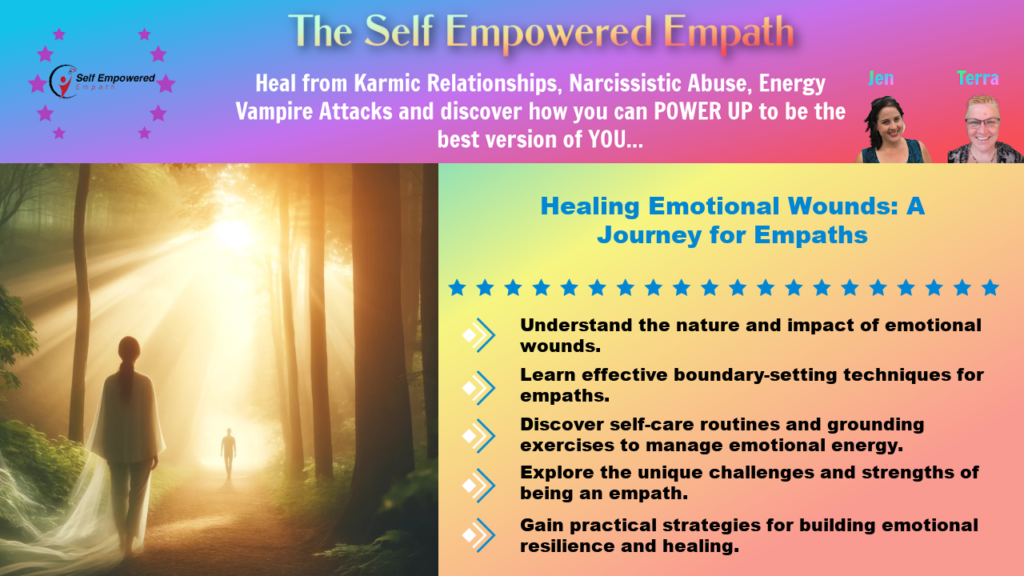
2. The Empath’s Journey: Challenges of Being an Empath
- 1. Understanding Emotional Wounds
- 2. The Empath’s Journey: Challenges of Being an Empath
- 3. The Empath’s Journey: Strengths of Being an Empath
- 4. The Empath’s Journey: Leveraging Your Sensitivity
- 5. Healing Techniques for Empaths
- 6. Building Resilience and Moving Forward
- 7. Conclusion
- 8. Additional Resources and Content
As an empath, you have a unique and beautiful gift—an extraordinary ability to deeply feel and understand the emotions of those around you. However, this heightened sensitivity comes with its own set of challenges that can sometimes feel overwhelming. These challenges can affect various aspects of your life, from personal relationships to your overall emotional and physical health.
Understanding and acknowledging these challenges is the first step towards managing them effectively. By doing so, you can learn to harness your empathic abilities in ways that benefit both yourself and others. Below is a table detailing the common challenges you may face as an empath and offering insights into overcoming them:
Setting Boundaries
One significant hurdle for empaths is setting boundaries. It can be difficult to distinguish between your own emotions and those you absorb from others. This emotional blurring often leaves you feeling overwhelmed and makes it challenging to prioritize self-care. Without clear boundaries, empaths may find themselves constantly drained, as they subconsciously take on the stress and negativity of people around them. This can lead to chronic fatigue, anxiety, and a diminished sense of self.
To manage this, it’s crucial for empaths to develop strong boundary-setting techniques. This might involve practices such as mindfulness and meditation to help center oneself, regular time alone to recharge, and being selective about the environments and people they allow into their lives. Learning to say “no” without guilt and setting clear, assertive boundaries can create a protective barrier, enabling empaths to maintain their emotional health while still being compassionate and supportive to others.
Additionally, seeking support from like-minded individuals or professionals who understand the unique challenges empaths face can provide much-needed validation and strategies for coping. Engaging in hobbies and activities that ground and uplift them can also be beneficial. By taking these steps, empaths can better navigate their emotional landscape, ensuring they have the energy and peace of mind to take care of both themselves and others.
Emotional Overload
Empaths are particularly prone to emotional overload. Your heightened perception of others’ feelings means you can quickly become saturated with emotional energy.
This can lead to physical and mental exhaustion, making it harder to focus on your own healing. Additionally, the tendency to prioritize others over yourself can exacerbate this issue, as you may feel compelled to support others even when you need healing.
Often, empaths struggle with setting boundaries, both emotional and physical, which can lead to an overwhelming sense of responsibility for others’ wellbeing. This self-imposed responsibility can manifest as chronic stress, anxiety, or even depression. The continuous input of others’ emotions can create a cluttered emotional landscape, leaving little room for an empath to process their own feelings and experiences.
Moreover, empaths may find it difficult to disengage from negative environments or relationships, fearing that doing so would harm those they care about. This difficulty in detaching can result in prolonged exposure to negative emotional stimuli, further contributing to burnout. Physical symptoms such as headaches, fatigue, and digestive issues often accompany this emotional strain, creating a cycle of discomfort that is hard to break.
Self-care is essential for empaths to prevent burnout. Practices like mindfulness, meditation, and grounding exercises can help manage the influx of emotional energy. Building a support network of understanding friends or joining empath support groups can also provide relief by sharing experiences and strategies. Regularly setting aside time for personal interests and activities that bring joy and relaxation can recharge an empath’s emotional batteries, making it easier to maintain a healthy balance between helping others and self-healing.
Energy Depletion
As an empath, you often find yourself highly sensitive to the emotions and energies of those around you. This heightened sensitivity can sometimes lead to energy depletion, leaving you feeling drained and emotionally exhausted. It’s essential to recognize this challenge and take proactive steps to manage your energy levels. One effective strategy is to establish strong boundaries. By defining clear limits on how much emotional energy you give to others, you can protect yourself from becoming overwhelmed. This might involve setting specific times for self-care, politely declining engagements that feel too taxing, or distancing yourself from particularly negative environments.
Another important aspect of managing energy depletion is developing a regular routine of self-replenishment. Activities like meditation, grounding exercises, and spending time in nature can help recharge your emotional batteries. Mindfulness practices, such as focusing on your breath or engaging in visualization techniques, can center and balance you, creating a buffer against absorbing too much external emotion. Additionally, prioritizing physical wellness through regular exercise, a balanced diet, and sufficient sleep can fortify your resilience. By incorporating these self-care practices into your daily life, you can maintain a steady emotional equilibrium, ensuring you’re better equipped to navigate the emotional landscapes you encounter.
Difficult Relationships
As an empath, dealing with difficult relationships can be particularly daunting due to your heightened sensitivity to emotions. You might find it easy to become overwhelmed by the negative energy and emotional turbulence that challenging relationships often bring. This sensitivity can lead to emotional exhaustion, as you tend to absorb the stress, anger, or sadness of those around you. Consequently, you may experience mood swings, anxiety, or even physical symptoms like headaches and fatigue, which can make it hard for you to maintain your own emotional equilibrium.
To manage these challenges, it is crucial for you to set and maintain strong boundaries. This involves clearly defining your emotional limits and effectively communicating them to others. Techniques such as mindfulness and meditation can help you stay centered and differentiate between your own emotions and those you absorb from others. By creating a safe emotional space and limiting interactions with particularly draining individuals, you can protect your well-being. Additionally, surrounding yourself with supportive and understanding people can offer the emotional validation and encouragement you need to navigate difficult relationships more resiliently.
Sensory Overload
As an empath, you often find yourself inundated by a barrage of sensory inputs, from bustling noises to overwhelming emotions. This constant influx can leave you feeling frazzled and exhausted. One of the best ways to combat sensory overload is to create a sanctuary of calm in your everyday life. Carve out a quiet space just for yourself where you can retreat and recharge. Whether it’s a cozy corner in your home or a nearby park, having a go-to spot to unwind can make a significant difference. Decorate your space with soothing colors, your favorite books, or soft cushions—anything that brings you peace and comfort.
Another valuable strategy is practicing mindfulness and grounding techniques. When you feel overwhelmed, take a few deep breaths to center yourself. Imagine roots growing from your feet into the earth, anchoring you firmly. This visualization helps to stabilize your energy and reduce the feeling of being swamped by external stimuli. Additionally, setting boundaries with people and situations that drain your energy is essential. Politely stepping back when you need to and saying “no” without guilt allows you to protect your emotional well-being, ensuring you can focus on what truly matters to you. By incorporating these practices into your daily routine, you can manage sensory overload more effectively and maintain a sense of calm even amidst chaos.
2. The Empath’s Journey: Challenges of Being an Empath
- 1. Understanding Emotional Wounds
- 2. The Empath’s Journey: Challenges of Being an Empath
- 3. The Empath’s Journey: Strengths of Being an Empath
- 4. The Empath’s Journey: Leveraging Your Sensitivity
- 5. Healing Techniques for Empaths
- 6. Building Resilience and Moving Forward
- 7. Conclusion
- 8. Additional Resources and Content











